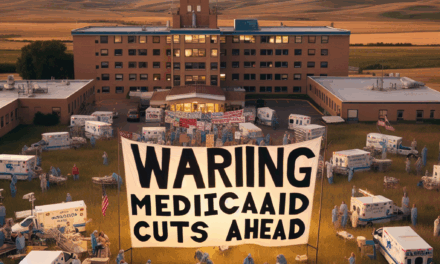RFK Jr. Criticizes GOP Medicaid Proposals as Misleading
Robert F. Kennedy Jr. (RFK Jr.), a prominent environmental attorney and political figure, has recently voiced strong criticisms against the Republican Party’s proposals regarding Medicaid. His arguments center around the assertion that these proposals are misleading and could have detrimental effects on millions of Americans who rely on Medicaid for their healthcare needs. This article delves into the intricacies of RFK Jr.’s criticisms, the implications of GOP Medicaid proposals, and the broader context of healthcare in the United States.
Understanding Medicaid: A Brief Overview
Medicaid is a state and federal program that provides health coverage to low-income individuals and families. Established in 1965, it has become a crucial safety net for millions of Americans, covering a wide range of services, including hospital visits, long-term care, and preventive services. Understanding the significance of Medicaid is essential to grasp the implications of any proposed changes to the program.
- Eligibility and Coverage: Medicaid eligibility varies by state, but generally, it covers low-income families, pregnant women, children, elderly individuals, and people with disabilities. The program is designed to ensure that those who cannot afford healthcare receive necessary medical services.
- Funding Structure: Medicaid is jointly funded by the federal government and states. The federal government provides matching funds to states, which can lead to significant variations in coverage and services based on state policies.
- Impact on Public Health: Medicaid plays a vital role in public health by providing access to preventive care, reducing hospitalizations, and improving health outcomes for vulnerable populations.
- Recent Expansion: The Affordable Care Act (ACA) allowed states to expand Medicaid, leading to millions more Americans gaining coverage. However, not all states opted for expansion, creating disparities in access to care.
- Challenges and Criticisms: Despite its successes, Medicaid faces challenges such as funding shortfalls, bureaucratic inefficiencies, and criticisms regarding the quality of care provided.
RFK Jr.’s Critique of GOP Proposals
RFK Jr. has been vocal about his concerns regarding the Republican Party’s proposals for Medicaid reform. He argues that these proposals are not only misleading but also threaten the very foundation of healthcare access for millions of Americans. His critique can be broken down into several key areas:
- Misrepresentation of Costs: RFK Jr. argues that GOP proposals often downplay the potential costs associated with cuts to Medicaid funding. He emphasizes that while proponents may claim that reducing funding will lead to savings, the reality is that such cuts can lead to increased emergency room visits and higher overall healthcare costs.
- Impact on Vulnerable Populations: The proposals, according to RFK Jr., disproportionately affect vulnerable populations, including children, the elderly, and individuals with disabilities. He highlights that these groups rely heavily on Medicaid for essential services and that cuts could lead to dire health consequences.
- Inadequate Alternatives: RFK Jr. criticizes the lack of viable alternatives presented by GOP lawmakers. He argues that simply cutting funding does not address the underlying issues within the healthcare system and fails to provide a comprehensive solution for those in need.
- Political Motivations: RFK Jr. suggests that the motivations behind these proposals are politically driven rather than focused on improving healthcare outcomes. He posits that the GOP’s push for Medicaid cuts aligns with a broader agenda of reducing government spending at the expense of public health.
- Historical Context: RFK Jr. places the current proposals within a historical context, noting that similar attempts to cut Medicaid have been made in the past. He argues that these efforts have consistently led to negative outcomes for those who depend on the program.
The Economic Implications of Medicaid Cuts
One of the most significant aspects of RFK Jr.’s critique is the economic implications of proposed Medicaid cuts. Understanding these implications requires a closer examination of how Medicaid functions within the broader economy.
- Healthcare Spending: Medicaid is a major player in the U.S. healthcare system, accounting for a substantial portion of healthcare spending. Cuts to Medicaid could lead to increased costs for hospitals and healthcare providers, as uninsured patients often rely on emergency services, which are more expensive than preventive care.
- Job Losses in the Healthcare Sector: The healthcare industry is a significant source of employment in the U.S. Reductions in Medicaid funding could lead to job losses in hospitals, clinics, and other healthcare facilities, further exacerbating economic challenges in communities that rely on these jobs.
- Impact on State Budgets: States that rely heavily on Medicaid funding may face budget shortfalls if federal funding is reduced. This could lead to cuts in other essential services, such as education and public safety, creating a ripple effect throughout the economy.
- Long-Term Health Costs: RFK Jr. argues that cutting Medicaid funding may lead to short-term savings but could result in long-term health costs. For example, untreated chronic conditions can lead to more severe health issues that require expensive interventions, ultimately increasing overall healthcare spending.
- Economic Inequality: Medicaid cuts could exacerbate economic inequality by disproportionately affecting low-income individuals and families. This could lead to a cycle of poverty and poor health outcomes, further straining public resources.
The Human Cost of Medicaid Cuts
Beyond the economic implications, RFK Jr. emphasizes the human cost associated with proposed Medicaid cuts. The impact on individuals and families who rely on Medicaid for their healthcare needs cannot be overstated.
- Access to Care: Many individuals who rely on Medicaid face barriers to accessing care, including long wait times and limited provider networks. Cuts to funding could exacerbate these issues, making it even more challenging for vulnerable populations to receive necessary medical attention.
- Health Outcomes: Research has shown that Medicaid expansion leads to improved health outcomes, including increased access to preventive services and better management of chronic conditions. Cuts to Medicaid could reverse these gains, leading to higher rates of morbidity and mortality among low-income populations.
- Emotional and Psychological Impact: The stress and anxiety associated with potential loss of healthcare coverage can have significant emotional and psychological effects on individuals and families. RFK Jr. highlights the importance of mental health services, which are often covered by Medicaid, in supporting overall well-being.
- Case Studies: Numerous case studies illustrate the real-life consequences of Medicaid cuts. For instance, in states that have previously reduced Medicaid funding, there have been documented increases in hospitalizations and emergency room visits, indicating a decline in overall health among affected populations.
- Advocacy and Resistance: RFK Jr. points to grassroots movements and advocacy groups that have emerged in response to proposed Medicaid cuts. These organizations work tirelessly to raise awareness about the importance of Medicaid and to mobilize public support for preserving and expanding the program.
The Future of Medicaid: A Call for Reform
As the debate over Medicaid continues, RFK Jr. advocates for a more comprehensive approach to healthcare reform that prioritizes access and equity. He argues that rather than cutting funding, lawmakers should focus on improving the efficiency and effectiveness of the Medicaid program.
- Expanding Coverage: One potential avenue for reform is expanding Medicaid coverage to include more low-income individuals and families. This could be achieved through state-level initiatives or by incentivizing states to adopt Medicaid expansion under the ACA.
- Improving Care Coordination: Enhancing care coordination for Medicaid recipients can lead to better health outcomes and reduced costs. This includes integrating physical and mental health services and providing support for social determinants of health.
- Investing in Preventive Care: RFK Jr. emphasizes the importance of investing in preventive care services, which can reduce the need for more expensive interventions down the line. This includes expanding access to screenings, vaccinations, and wellness programs.
- Addressing Systemic Inequities: A comprehensive reform effort must address systemic inequities within the healthcare system. This includes tackling issues such as racial disparities in healthcare access and outcomes, which are often exacerbated by Medicaid cuts.
- Engaging Stakeholders: RFK Jr. calls for greater engagement with stakeholders, including healthcare providers, patients, and advocacy groups, in the reform process. Collaborative efforts can lead to more effective solutions that meet the needs of those who rely on Medicaid.
Conclusion: The Importance of Protecting Medicaid
RFK Jr.’s criticisms of GOP Medicaid proposals highlight the complex interplay between healthcare policy, economic implications, and the human cost of potential cuts. As the debate continues, it is crucial to recognize the importance of Medicaid as a lifeline for millions of Americans. Rather than pursuing cuts that could jeopardize access to care, lawmakers should focus on comprehensive reforms that prioritize health equity and improve the overall effectiveness of the program.
The future of Medicaid is at a crossroads, and the decisions made in the coming years will have lasting implications for public health and the well-being of vulnerable populations. By advocating for thoughtful and inclusive reforms, we can work towards a healthcare system that truly serves the needs of all Americans.



